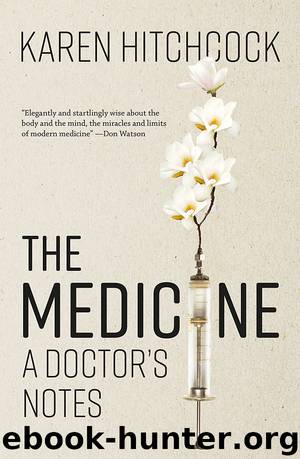The Medicine by Karen Hitchcock

Author:Karen Hitchcock
Language: eng
Format: epub
Publisher: Schwartz Books Pty. Ltd.
(In response, a critic of the psilocybin trials, Professor James Coyne, a clinical psychologist who holds academic positions at the universities of Groningen, Stirling and Pennsylvania, wrote, “This investigator’s New Age depiction of mechanism falls short of conventional scientific standards.”)
At one point in his recent book How to Change Your Mind, a participant-observer exploration of trip-therapies, author Michael Pollan fills out a validated questionnaire – the MEQ30 – to ascertain whether or not his 5-methoxy-N, N-dimethyltryptamine (5-MeODMT) trip qualified as a mystical experience. He made it to mystical by one point. Hallelujah …
When it comes to mechanisms regarding mental illness and distress, “conventional scientific depictions” seem to have led us nowhere particularly useful thus far. Perhaps conventional scientific understandings of the phenomenological experience of being human are inadequate. We are just at the very beginning of anything approaching a sophisticated understanding of human consciousness and our experience of sentience. From where in the wet mass of your brain, with its 90 billion cells, does the sense that you are you arise? Noxious subjective feeling states are in a sense “all in our mind”, or woven from the stories our minds spin about our selves and our world. How can a doctor treat that? Fifteen years on a couch might do the trick. But you can’t merely tell a patient she is not worthless. You can’t merely tell a patient there is nothing wrong with his body that feels pain all over all the time, nor convince a man that every shadow does not hide an attack. Many of our modern afflictions (versions of which we have struggled to understand for centuries) might thus be seen as a kind of disorder (or stuckness) of thought. It is hypothesised that psychedelics relax prior assumptions, beliefs and defences, which can greatly facilitate psychotherapeutic work. As Pollan puts it, psychedelics can help reverse “petrifaction of thought”.
Of course, it may turn out that the drugs are a kind of spectacularly effective placebo, with their dramatic mental effects and inducement of heightened suggestibility, and the concomitant psychotherapy with someone who has kept you safe as you went on an internal, sometimes scary journey (which surely generates an intimacy of sorts). Subjects come into the treatment with expectations, often reinforced by the therapists. If this does turn out to be the case, then so be it. Given the low risk, the non-toxic profile, the short treatment duration and the seemingly drastic treatment effects, it would be a powerful wielding of the placebo effect (an effect medicine has always used).
*
Outside of psychotherapeutic circles, the culture of psychedelic use is as far removed from the 1960s hippie counter-culture as one could imagine. The non-medicinal use of psychedelics is occurring in Silicon Valley and other enclaves of the tech and entrepreneurial worlds. In this realm the drugs are used as tools for optimising cognition and creativity. These high-performers trip in order to come up with new ideas, solve problems, think “outside the box”. They trip because it makes them more productive.
Download
This site does not store any files on its server. We only index and link to content provided by other sites. Please contact the content providers to delete copyright contents if any and email us, we'll remove relevant links or contents immediately.
Pocahontas by Joseph Bruchac(3722)
Adulting by Kelly Williams Brown(3669)
Unfiltered by Lily Collins(3612)
In the Shadow of Liberty by Kenneth C. Davis(3131)
Earthrise by Edgar Mitchell(2757)
Almost Adulting by Arden Rose(2296)
Charlie and the Chocolate Factory (Puffin Modern Classics) by Roald Dahl(2027)
Fierce by Aly Raisman(1854)
The Audition by Maddie Ziegler(1814)
Borders by unknow(1785)
I Will Always Write Back by Martin Ganda(1765)
Women in Science by Rachel Ignotofsky(1409)
The Day the President Was Shot by Bill O'Reilly(1368)
Amelia Earhart by Doris L. Rich(1338)
The Last Days of Jesus by Bill O'Reilly(1261)
God's Smuggler by Brother Andrew(1218)
Redefining Realness by Janet Mock(1216)
Extraordinary, Ordinary People by Condoleezza Rice(1205)
Popular: Vintage Wisdom for a Modern Geek by Maya Van Wagenen(1152)
